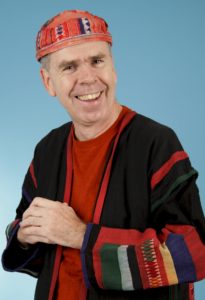#MeetTheStoryteller Episode 5
Name: ROGER JENKINS
From: Singapore
*** *** ***
Hey Roger, what’s your story?
When I say I am Singaporean, people often go ‘”Hunh?!” I was born in Singapore (back in the Jurassic period) to British service parents, but grew up in UK. After I returned to Singapore to work (as a drama teacher) it was a pretty easy decision to take up my birthright (Singapore doesn’t allow dual nationality.)
 How did you find yourself in Storytelling?
How did you find yourself in Storytelling?
In my former life as a theatre practitioner, I was always telling stories as an actor, director, playwright and even comic improviser – but while these were all excellent preparation to be a teller, they’re not Storytelling.
It was only when I was asked to conduct a course for primary teachers in 1998 on Using Storytelling in the Language Classroom that I stumbled across it as a distinct art form. I felt I had to lead by example, and the moment I stood up in front of that first group of 30 and saw them sat wrapt, attentive and even open-mouthed, I was hooked.
But I didn’t think about becoming a full-time teller (I had no idea such a career existed!) until one day, during the (now defunct) Singapore International Storytelling Festival, I was chatting with the wonderful American teller, Margaret Read MacDonald over tea. (One of the best things about going to Festivals is that you can grab opportunities to get close and personal with your favorite tellers!) After listening to her adventures for a while, I remember saying to her, “So let me get this straight. You travel around the world telling stories?! And people pay you money to tell stories?!” Right then and there, I said to myself: this is a job I want! It took me five years to develop a repertoire and some reputation, but then I closed my theatre company and set up shop as a full-time teller.
How are your storytelling performances like?
I usually tell alone, but I have from time-to-time, worked with a number of hearing-impaired partners, or Mother Tongue tellers – I’m a great believer in getting Mother Tongue out of the MT classroom and into the life of the school!
I do like to wear something that says to the audience, ‘this guy’s fun and possibly worth listening to/watching’. I don’t like it when I go to a storytelling performance and the teller’s in jeans and a t-shirt! I tell a lot of Asian folktales (a deliberate decision from Day 1, given my location and the sense that kids are far too exposed to Disney/Hollywood) and so I have a lot of ethnic stuff – batik from Indonesia/Malaysia, jackets from Thailand, Indian cotton kurta (long shirts). I never wear character costumes though – I’m too many people in one show!
Why storytelling?
Well, I find it hugely rewarding emotionally and socially (and it’s not too shabby financially, either!) For the most part I choose the tales I want to tell. I love what the stories say to me, so I’m delighted to be able to share their wisdom with others. I’m an entertainer, so I like making people laugh, and telling enables me to do that – a lot. I feel when I tell I’m the best version of myself. I’m not half as good a husband or a father as I’d like to be though.
How has the story – journey been?
I was blessed that my storytelling journey began when the Singapore ISF was in its heyday and between 2001 – 2006 I got to perform alongside some of the who’s who of world storytelling – apart from Margaret, Diane Ferlatte, Sheri & Bobby Norfolk, Eth-Noh-Tec, Dan Yashinsky, Cathy Spagnoli, Antonio Rocha, Fran Stallings. The marvellous Jeeva Raghunath from Chennai came to the first festival same as me and we’ve been close friends traveling the story road ever since. It’s really important that young tellers(i.e inexperienced; I was almost 50 when I came to my first SISF) are given the opportunity to tell alongside professionals. Apart from what it does for your CV, you learn so much from watching/listening to others tell a story – especially if you’re facing the same audience.
What key skills do I feel are a must have for a performance storyteller? The ones you can’t be taught! You’ve got to be comfortable with people, happy to stand in front of an audience and be yourself, to open up and be you. I think that’s why almost every storyteller I know is a nice person, the kind you like to spend time with (Of course there are exceptions!!) If you’re not a warm, likeable human being, people won’t want to listen to you, not matter how good your stories are.
One of the wonderful things about storytelling is that there are no hard-and-fast rules about the way you tell a story. The skill is drawing on whatever talents/interests you have. If you like to sing, sing! (And show me an African teller who isn’t also a dancer!) Play a musical instrument? Play! Like magic? Work in a trick! Good at art or craft? Fine – illustrate your stories with your artwork, origami or balsa models!
 What tips would you give someone who wants to take Performance Storytelling as a career?
What tips would you give someone who wants to take Performance Storytelling as a career?
1) Know what kind of stories/audiences you want to tell to. Hunt for those opportunities.
2) Be prepared to take on new challenges – different audiences/settings – but make sure you adapt the way you tell (and your repertoire) to suit those occasions.
3) Develop your story-telling antenna so that you’ll recognize good stories when you hear one / read one / see one on YouTube, so that you can add it to your repertoire; you’ll become aware of opportunities for you to share your skills. Most CEO’s, businesses & organizations etc will have no idea how you could help make their opening / launch / family day / campaign / exhibition / celebration / convention / expo / memorial / anniversary more meaningful and memorable. They need a story. They need you. But you need to let them know how you can share a story that captures the essence of their occasion.
4) Look after yourself – your health, and especially your voice. If you’re sick, you’re not working. If you’re not working, you’re not getting paid (never heard of a salaried storyteller!)
Parting shots
- To be a person is to have a story to tell. — Isak Dinesen (Out of Africa!!)
- Fairy tales are more than true: not because they tell us that dragons exist, but because they tell us that dragons can be beaten. — G. K. Chesterton
*** *** ***
You can get in touch with Roger Jenkins on his website
http://www.rogerjenkins.com.sg/ You can also see his review of the Sigana International Storytelling Festival 2016 (Nairobi) here
http://www.rogerjenkins.com.sg/siganafestival.html
